In time of crisis, Donald Trump – Nancy Pelosi relationship remains broken
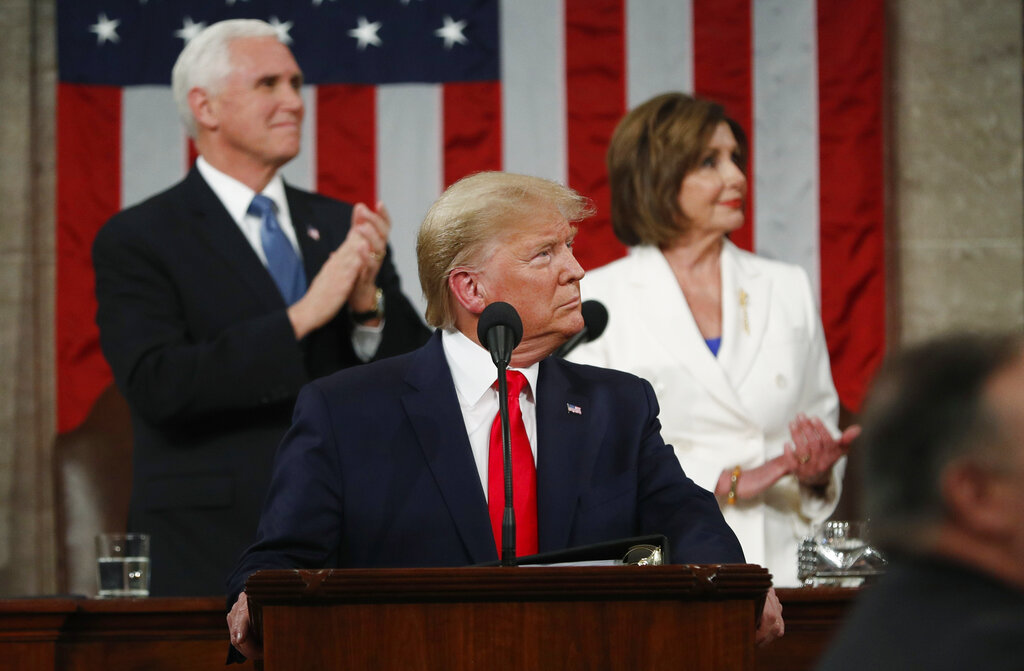
It has been five months since the two leaders last spoke.
Joseph Lowery, civil rights leader and MLK aide, dies at 98
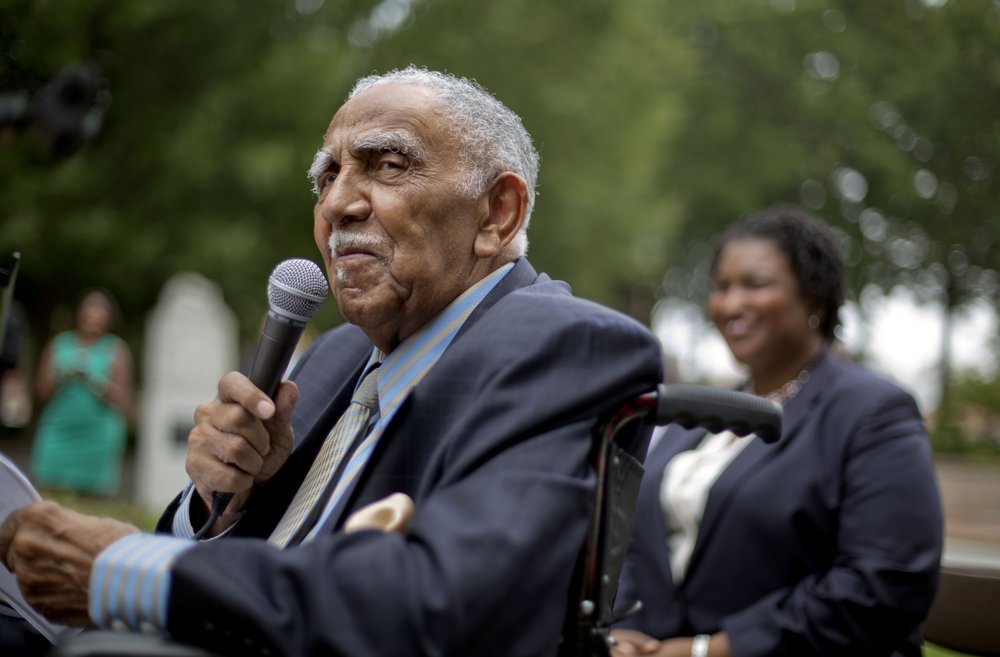
Rev. Lowery was born in Huntsville and was considered the dean of civil rights veterans.
Donald Trump’s economic aid could approach $1T, senators say
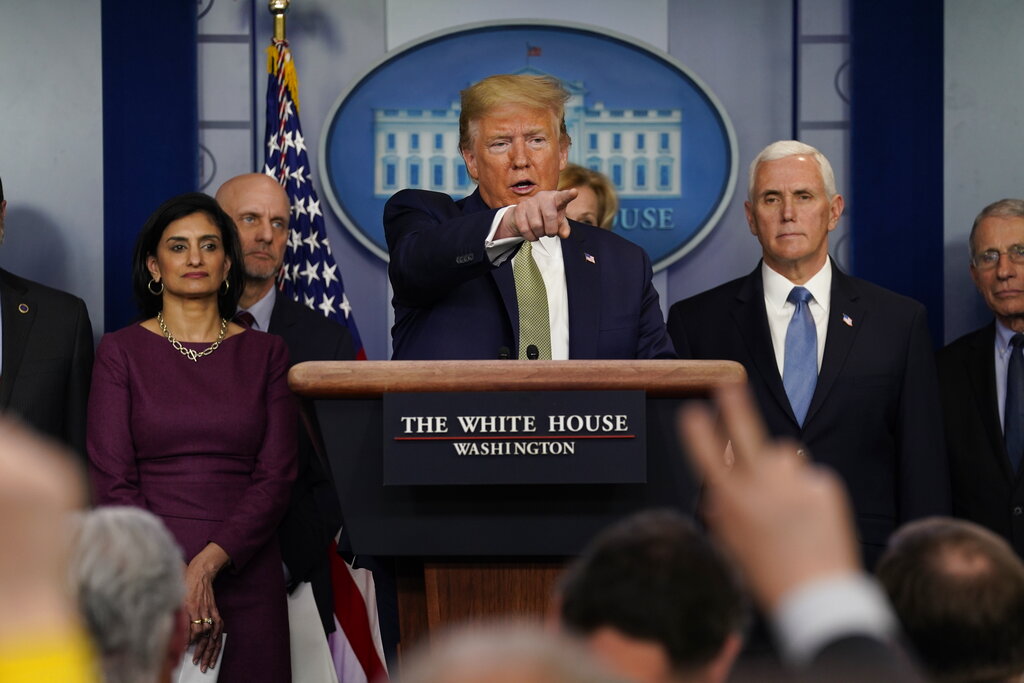
The Trump administration is asking congress to appropriate funds directly to Americans in an effort to shore up households and the economy.
Joe Biden pivots focus to Donald Trump amid coronavirus concerns

The new coronavirus has upended the presidential campaign at a crucial moment.
Donald Trump takes Daytona 500 warmup lap in presidential limousine

Following the opening command, Donald Trump’s motorcade took to the track to join in a warm-up lap.
GOP squirms as John Bolton prepares to dish on Donald Trump White House
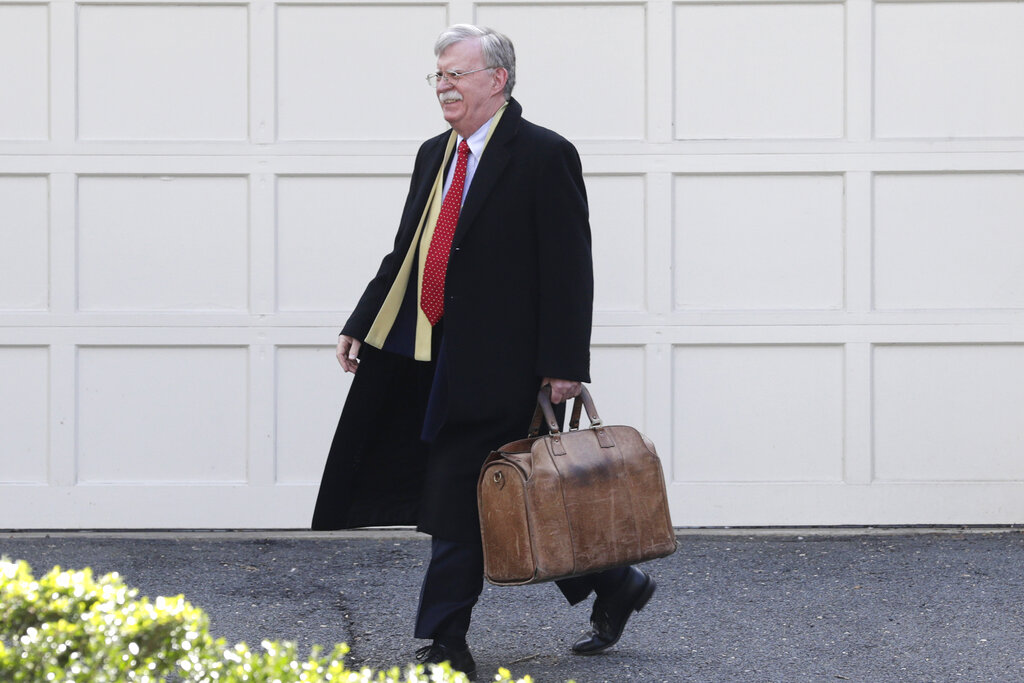
After this week’s early leaks about the book, White House aides and allies are privately expressing concern about what more Bolton might reveal.
Donald Trump, a late convert to cause, to join anti-abortion rally
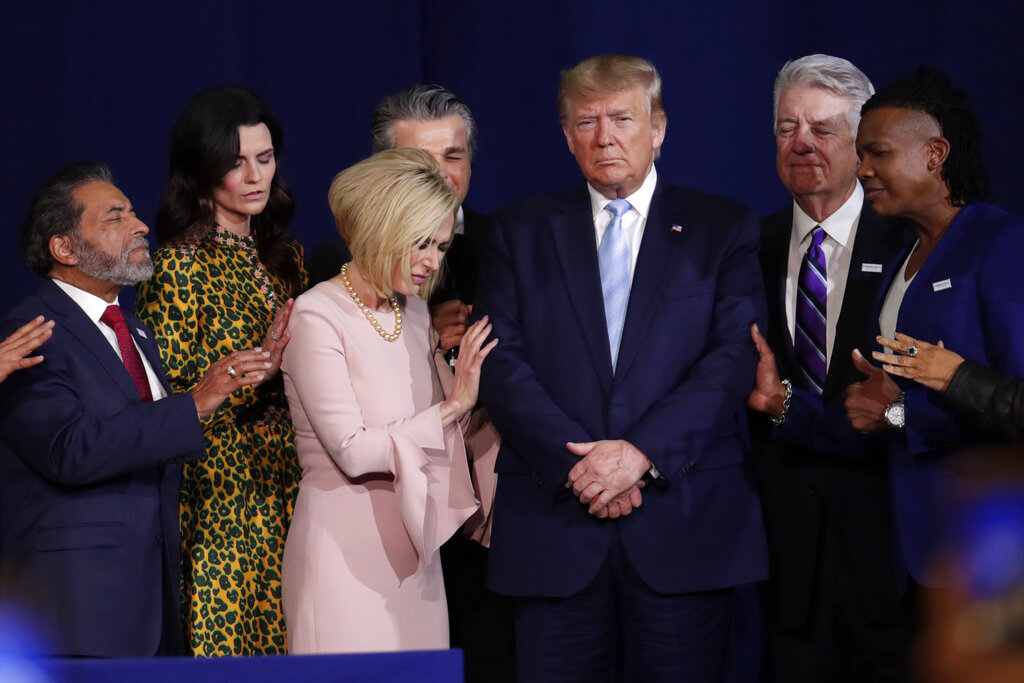
It’s Trump’s latest nod to some of his most loyal backers.
Elusive Quest for Momentum is On as Democrats Dash to Iowa

No candidate is a clear leader as the Iowa caucuses draw near.
Iowa swung fiercely to Donald Trump. Will it swing back in 2020?
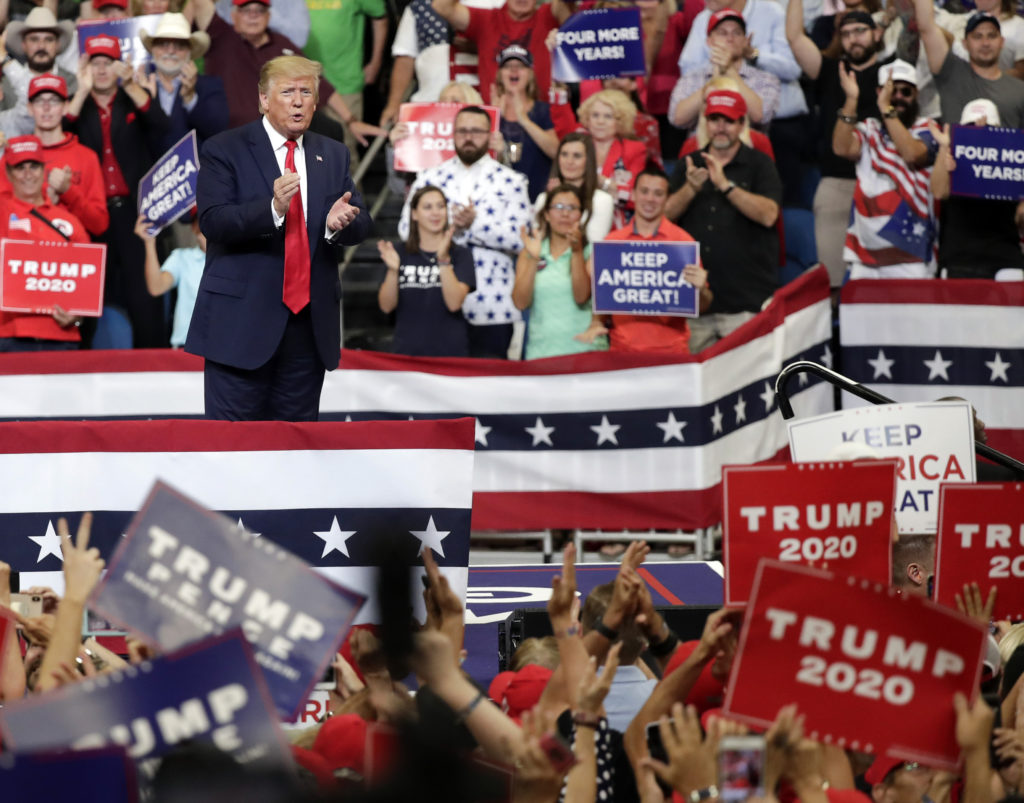
Few states have changed politically with the head-snapping speed of Iowa. Heading into 2020, the question is whether it’s going to change again. In 2008, its voters propelled Barack Obama to the White House, as an overwhelmingly white state validated the candidacy of the first black president. A year later, Iowa’s Supreme Court sanctioned same-sex marriage, adding a voice of Midwestern sensibility to a national shift in public sentiment. In 2012, Iowa backed Obama again. All that change proved too much, too fast, and it came as the Great Recession punished agricultural areas, shook the foundations of rural life and stoked a roiling sense of grievance. By 2016, Donald Trump easily defeated Hillary Clinton in Iowa. Republicans were in control of the governor’s mansion and state legislature and held all but one U.S. House seat. For the first time since 1980, both U.S. Senate seats were in GOP hands. What happened? Voters were slow to embrace Obama’s signature health care law. The recession depleted college-educated voters as a share of the rural population, and Republicans successfully painted Democrats’ as the party of coastal elites. Those forces combined for a swift Republican resurgence and helped create a wide lane for Trump. The self-proclaimed billionaire populist ended up carrying Iowa by a larger percentage of the vote than in Texas, winning 93 of Iowa’s 99 counties, including places like working-class Dubuque and Wapello counties, where no Republican since Dwight D. Eisenhower had won. But now, as Democrats turn their focus to Iowa’s kickoff caucuses that begin the process of selecting Trump’s challenger, could the state be showing furtive signs of swinging back? Caucus turnout will provide some early measures of Democratic enthusiasm, and of what kind of candidate Iowa’s Democratic voters — who have a good record of picking the Democratic nominee — believe has the best chance against Trump. If Iowa’s rightward swing has stalled, it could be a foreboding sign for Trump in other upper Midwestern states he carried by much smaller margins and would need to win again. “They’ve gone too far to the right and there is the slow movement back,” Tom Vilsack, the only two-term Democratic governor in the past 50 years, said of Republicans. “This is an actual correction.” Iowans unseated two Republican U.S. House members — and nearly a third — in 2018 during midterm elections where more Iowa voters in the aggregate chose a Democrat for federal office for the first time in a decade. In doing so, Iowans sent the state’s first Democratic women to Congress: Cindy Axne, who dominated Des Moines and its suburbs, and Abby Finkenauer, who won in several working-class counties Trump carried. Democrats won 14 of the 31 Iowa counties that Trump won in 2016 but Obama won in 2008, though Trump’s return to the ballot in 2020 could change all that. “We won a number of legislative challenge races against incumbent Republicans,” veteran Iowa Democratic campaign consultant Jeff Link said. “I think that leaves little question Iowa is up for grabs next year.” There’s more going on in Iowa that simply a merely cyclical swing. Iowa’s metropolitan areas, some of the fastest growing in the country over the past two decades, have given birth to a new political front where Democrats saw gains in 2018. The once-GOP-leaning suburbs and exurbs, especially to the north and west of Des Moines and the corridor linking Cedar Rapids and the University of Iowa in Iowa City, swelled with college-educated adults in the past decade, giving rise to a new class of rising Democratic leaders. “I don’t believe it was temporary,” Iowa State University economist David Swenson said of Democrats’ 2018 gains in suburban Des Moines and Cedar Rapids. “I think it is the inexorable outcome of demographic and educational shifts that have been going on.” The Democratic caucuses will provide a test of how broad the change may be. “I think it would be folly to say Iowa is not a competitive state,” said John Stineman, a veteran Iowa GOP campaign operative and political data analyst who is unaffiliated with the Trump campaign but has advised presidential and congressional campaigns over the past 25 years. “I believe Iowa is a swing state in 2020.” For now, that is not a widely held view, as Iowa has shown signs of losing its swing state status. In the 1980s, it gave rise to a populist movement in rural areas from the left, the ascent of the religious right as a political force and the start of an enduring rural-urban balance embodied by Republican Sen. Chuck Grassley and Democratic Sen. Tom Harkin. Now, after a decade-long Republican trend, there are signs of shifting alliances in people like Jenny O’Toole. The 48-year-old insurance industry employee from suburban Cedar Rapids stood on the edge of the scrum surrounding former Vice President Joe Biden last spring, trying to get a glimpse as he shook hands and posed for pictures. “I was a Republican. Not any more,” O’Toole said. “I’m socially liberal, but economically conservative. That’s what I’m looking for.” O’Toole is among those current and new former Republicans who dot Democratic presidential events, from Iowa farm hubs to working-class river towns to booming suburbs. Janet Cosgrove, a 75-year-old Episcopal minister from Atlantic, in western Iowa, and Judy Hoakison, a 65-year-old farmer from rural southwest Iowa, are Republicans who caught Mayor Pete Buttigieg’s recent trip. If such voters are a quiet warning to Trump in Iowa, similar symptoms in Wisconsin and Michigan, where Democrats also made 2018 gains, could be even more problematic. Vilsack has seen the stage change dramatically. After 30 years of Republican dominance in Iowa’s governor’s mansion, he was elected in 1998 as a former small-city mayor and pragmatic state senator. An era of partisan balance in Iowa took hold, punctuated by Democratic presidential nominee Al Gore’s 4,144-vote victory in Iowa in 2000, and George W. Bush’s 10,059-vote re-election in 2004. After the 2006 national wave swept Democrats into total Statehouse control for the
Gun background checks are on pace to break record in 2019

Background checks on gun purchases in the U.S. are climbing toward a record high this year, reflecting what the industry says is a rush by people to buy weapons in reaction to the Democratic presidential candidates’ calls for tighter restrictions. By the end of November, more than 25.4 million background checks — generally seen as a strong indicator of gun sales — had been conducted by the FBI, putting 2019 on pace to break the record of 27.5 million set in 2016, the last full year President Barack Obama was in the White House. On Black Friday alone, the FBI ran 202,465 checks. Some analysts question how accurately the background check figures translate into gun sales, since some states run checks on applications for concealed-carry permits, too, and some purchases involve multiple firearms. But the numbers remain the most reliable method of tracking the industry. In the years since President Donald Trump took office, the industry has struggled through what has been referred to as the Trump Slump, a falloff in sales that reflected little worry among gun owners about gun control efforts. But with the 2020 presidential election less than a year out and virtually every Democratic candidate offering proposals to restrict access to firearms, fears appear to be driving up sales again. “The Trump Slump is real, but the politics of guns has changed a little bit over the last year,” said Adam Winkler, a professor at the University of California, Los Angeles, School of Law and an expert on gun rights and politics. “As we’re coming up upon another presidential election, Donald Trump is vulnerable, and the Democratic presidential contenders are falling all over themselves to propose more aggressive gun reforms than their opponents.” Trump has been viewed as one of the most gun-friendly presidents in modern history and has boasted of strong support from the National Rifle Association. He has addressed every one of its annual conventions since the 2016 campaign, and the powerful gun lobby pumped about $30 million into efforts to elect him. Still, hopes of expanded gun rights under Trump’s watch haven’t materialized. Legislation that would make it easier to buy silencers stalled in Congress. In addition, Trump pushed through a ban on bump stocks, which allow semiautomatic rifles to mimic machine-gun fire. The gunman who killed 58 people in Las Vegas in 2017 in the deadliest mass shooting in modern U.S. history used such a device. The industry has been going through one of its toughest periods, with some gunmakers, such as Remington Arms, filing for bankruptcy. More recently, Smith & Wesson’s parent company, American Outdoor Brands, announced plans to spin off its firearms unit, and Colt said it would suspend production of AR-15 rifles. Amid some high-profile mass shootings in recent years, especially the Parkland school attack in Florida that left 17 people dead, gun control advocates have gained some momentum. The crowded field of Democrats running for the White House has offered a variety of proposals to curtail gun rights. Former Texas Rep. Beto O’Rourke, whose state has seen repeated mass shootings this past year, went so far as to push for a mandatory buyback program for Arizona and Arkansas style rifles before dropping out of the race, stoking gun owners’ fears when he declared during a debate, “Hell, yes, we’re going to take your AR-15, your AK-47.” The gun industry says the figures from the National Instant Criminal Background Check System reflect the Second Amendment politics of the White House race. “Americans are choosing to invest their hard-earned dollars in their ability to exercise their rights and buy the firearms they want before gun control politicians attempt to regulate away that ability,” said Mark Oliva, spokesman for the National Shooting Sports Foundation, which represents the gun industry. Still, some experts took issue with the figures and said it is premature to declare the Trump Slump is over. “These numbers cannot be taken be taken at face value,” said Jurgen Brauer, a retired business professor and now chief economist at Small Arms Analytics, which consults on the firearms industry. Brauer said the numbers are increasingly skewed by states such as Kentucky that also run background checks when they issue or renew a permit to carry a concealed firearm. In October, for example, the state ran more than 280,000 checks through the NICS system for permits. “That number has been rising over time as increasingly states check with some frequency on their existing permits,” Brauer said. The NICS system was created after passage of the Brady Bill, which mandated background checks to buy a firearm. Convicted felons, domestic abusers and people who have been involuntarily committed to a mental institution are among those who cannot legally purchase a weapon. In 1999, the first full year the system was used, just over 9 million background checks were conducted. It was near the end of Democrat Bill Clinton’s second term and in the midst of a 10-year ban on assault rifles that expired in 2004. Background checks declined under President George W. Bush but picked up again in 2006 and have mostly risen since then, except for 2014 and 2017. In 2018, there were 26.18 million background checks. “Gunmakers are promoting the idea that you should buy these guns now because they may be banned in the future,” Winkler said. This story has been corrected to delete the number of seconds per background check on Black Friday. By Lisa Marie Pane Associated Press. Republished with the Permission of the Associated Press.
Shifting explanations for withholding aid draw GOP alarm
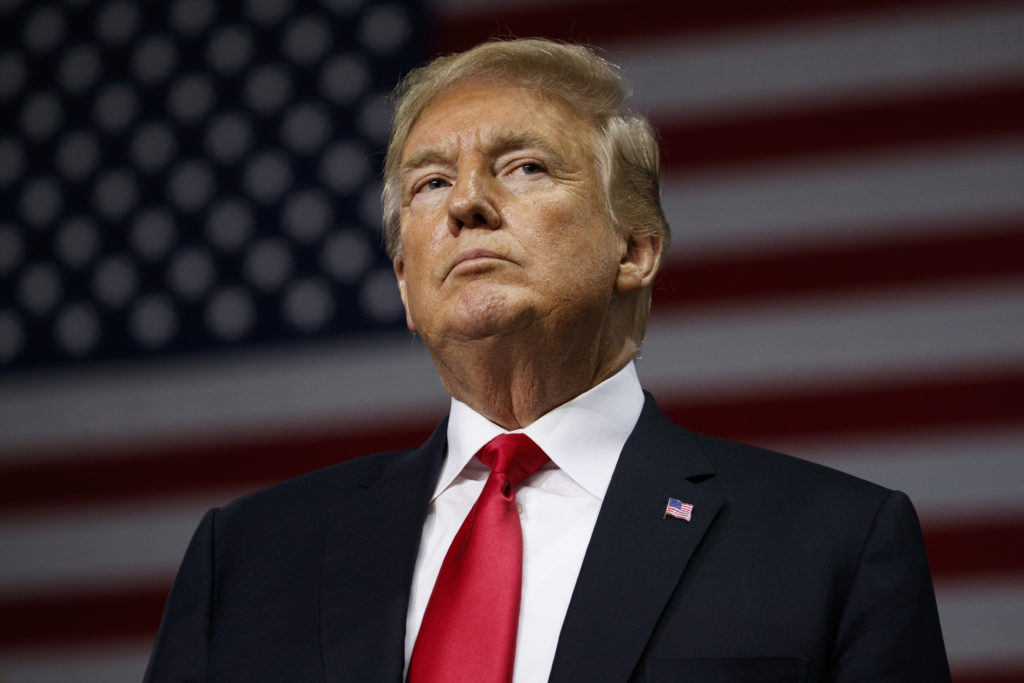
The shifting White House explanation for President Donald Trump’s decision to withhold military aid from Ukraine drew alarm Friday from Republicans as the impeachment inquiry brought a new test of their alliance. Trump, in remarks at the White House, stood by his acting chief of staff, Mick Mulvaney, whose earlier comments undermined the administration’s defense in the impeachment probe. Speaking Thursday at a news conference, Mulvaney essentially acknowledged a quid pro quo with Ukraine that Trump has long denied, saying U.S. aid was withheld from Kyiv to push for an investigation of the Democratic National Committee and the 2016 election. He later clarified his remarks. Trump appeared satisfied with Mulvaney’s clarification and the president dismissed the entire House inquiry as “a terrible witch hunt. This is so bad for our country.” But former Ohio Gov. John Kasich, who ran against Trump in the 2016 Republican primary, said he now supports impeaching the president. Mulvaney’s admission, he said, was the “final straw.” ”The last 24 hours has really forced me to review all of this,” Kasich said on CNN. In Congress, at least one Republican, Rep. Francis Rooney of Florida, spoke out publicly, telling reporters that he and others were concerned by Mulvaney’s remarks. Rooney said he’s open to considering all sides in the impeachment inquiry. He also said Mulvaney’s comments cannot simply be undone by a follow-up statement. “It’s not an Etch-A-Sketch,” said Rooney, a former ambassador to the Holy See under President George W. Bush. “The only thing I can assume is, he meant what he had to say — that there was a quid pro quo on this stuff,” he said. The tumult over Mulvaney’s remarks capped a momentous week in the impeachment investigation as the admission, from highest levels of the administration, undercut the White House defense and pushed more evidence into the inquiry. GOP leaders tried to contain the fallout. But four weeks into the inquiry, the events around Trump’s interaction with the Ukraine president, which are are at the heart of impeachment, have upended Washington. The Energy Secretary, Rick Perry, who has been caught up in the probe, announced his resignation. A beloved House chairman, Rep. Elijah Cummings, Democrat-Maryland, a leading figure in the investigation, died amid ongoing health challenges. The march toward an impeachment vote now seems all but inevitable, so much so that the highest-ranking Republican, Senate Majority Leader Mitch McConnell, privately told his GOP colleagues this week to expect action in the House by Thanksgiving with a Senate trial by Christmas. Speaker Nancy Pelosi has given no timeline for conclusion but wants the inquiry completed “expeditiously.” She said Thursday that facts of the investigation will determine next steps. “The timeline will depend on the truth line,” she told reporters. This week’s hours of back-to-back closed-door hearings from diplomats and former top aides appeared to be providing investigators with a remarkably consistent account of the run-up and aftermath of Trump’s call with Ukraine President Volodymy Zelenskiy. In that July call, Trump asked the newly elected Zelenskiy for a “favor” in investigating the Democratic National Committee’s email situation, which was central to the 2016 election, as well as a Ukraine gas company, Burisma, linked to the family of Trump’s 2020 Democratic rival, Joe Biden, according to a rough transcript of the phone conversation released by the White House. Republican leaders tried to align with Trump Friday, amid their own mixed messages as House Democrats, who already issued a subpoena to Mulvaney for documents, now want to hear directly from him. Rep. Kevin McCarthy, the House GOP leader, cited Mulvaney’s clarification as evidence that there was no quid pro quo. He said witnesses have also testified similarly behind closed doors in the impeachment inquiry. “We’ve been very clear,” McCarthy said. “There was no quid pro quo.” Lawmakers involved in the three House committees conducting the investigation want to hear more next week, which promises another packed schedule of witnesses appearing behind closed doors. Republicans want the interviews made open to the public, including releasing transcripts. Democrats in the probe being led by Rep. Adam Schiff, chairman of the Intelligence Committee, are keeping the proceedings closed for now, partly to prevent witnesses from comparing notes. Three House committees investigating impeachment have tentatively scheduled several closed-door interviews next week, including one with Bill Taylor, the current top official at the U.S. Embassy in Ukraine. Taylor’s interview, scheduled for Tuesday, is significant because he was among the diplomats on a text message string during the time around the July phone call. He raised a red flag and said it was “crazy” to withhold the military aid for a political investigation. It’s unclear whether all the witnesses will appear, given that the White House is opposing the inquiry and trying to block officials from testifying. The schedule includes a mix of State Department officials and White House aides. By Lisa Mascaro, Andrew Taylor, Mary Clare Jalonick Associated Press Republished with the permission of the Associated Press
Brett Kavanaugh faces final round of questioning without missteps
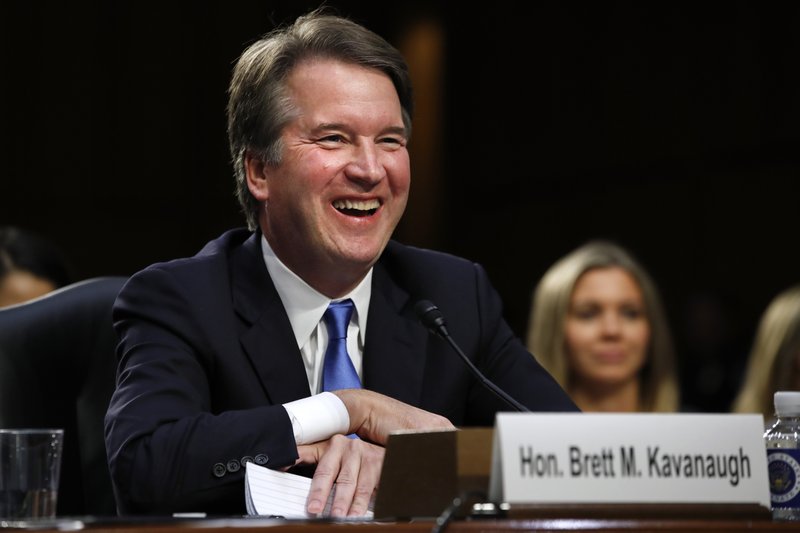
Senators will launch a final round of questioning of Brett Kavanaugh on Thursday, but after a marathon 12-hour session, President Donald Trump’s nominee to the Supreme Court appears to have avoided any major missteps that could trip his confirmation. So far, Kavanaugh does not seem to have changed minds on the Judiciary Committee, which is split along partisan lines. The judge left unanswered questions over how he would handle investigations of the executive branch and whether he would recuse himself if cases involving Trump under special counsel Robert Mueller’s probe end up at the court. His credibility may face new tests by senators who are seeking to make public some emails and documents from his Bush White House years that are being withheld by the committee as confidential. Trump says he’s pleased with his nominee’s televised performance, and Republicans are united behind him, eager to add a conservative judge to the court. The questioning of Kavanaugh has carried strong political overtones ahead of the November congressional elections. Democrats lack the votes to block confirmation, but have been pressing Kavanaugh for his views on abortion rights, gun control and other issues. Protesters have added to the challenges for Kavanaugh, repeatedly interrupting proceedings. “You’re more than halfway done,” Sen. Thom Tillis, R-N.C., told Kavanaugh as he gaveled the hearing closed late Wednesday. Pressured by Democrats with Trump on their minds during Wednesday’s grueling session, the judge insisted that he fully embraced the importance of judicial independence. But he refused to provide direct answers to Democrats who wanted him to say whether there are limits on a president’s power to issue pardons, including to himself or in exchange for a bribe. He also would not say whether he believes the president can be subpoenaed to testify. Still, he began his long day in the witness chair by declaring that “no one is above the law.” When Sen. Jeff Flake, R-Ariz., asked what constraints exist on executive power, the judge cited existing laws but also norms. “Norms are important. Historical practice is relevant to judicial decision-making,” he said. Democrats are concerned that Kavanaugh will push the court to the right and that he will side with Trump in cases stemming from Mueller’s investigation of Russian interference in the 2016 election and possible ties to the Trump campaign. The 53-year-old appellate judge answered cautiously when asked about most of those matters, refusing an invitation from Democratic Sen. Richard Blumenthal of Connecticut to pledge to step aside from any Supreme Court cases dealing with Trump and Mueller’s investigation. Under questioning by Republicans, Kavanaugh stressed the importance of judicial independence, “not being swayed by political or public pressure.” On abortion, Kavanaugh said the landmark 1973 Roe v. Wade decision that ensures access to abortion has been affirmed “many times.” He defended his dissenting opinion last year in the case of a pregnant immigrant teen in federal custody. Kavanaugh would have denied her immediate access to an abortion, even after she received permission from a Texas judge. Sen. Orrin Hatch, R-Utah, praised Kavanaugh for hiring female lawyers as clerks as a judge on the District of Columbia Court of Appeals, and then posed questions about whether Kavanaugh was aware of sexual harassment allegations against retired circuit court Judge Alex Kozinski in California. Kavanaugh, who considered the judge a friend and mentor, said he had known nothing about the allegations until they were disclosed last year. “It was a gut punch for me,” he said, and he was “shocked, disappointed, angry.” Kavanaugh also told Sen. Mazie Hirono, D-Hawaii, he was unaware of the domestic violence allegations against Rob Porter, who was Trump’s staff secretary. Journalist Bob Woodward’s new book about Trump says Kavanaugh recommended Porter for the job. Kavanaugh had served as staff secretary to George W. Bush and his work in the White House has figured in the hearing. Democratic senators have fought for access to documents from his three years as staff secretary, saying those could shed light on his views about policies from that era, including the detention and interrogation of terror suspects. Republicans have declined to seek the papers, and instead have gathered documents from his work as White House counsel to Bush. When questioned about the honesty of his 2006 testimony during his nomination for the appellate court when he said he was not involved in some Bush-era policies, Kavanaugh said he was “100 percent accurate.” Late Wednesday, Sen. Cory Booker, D-N.J., drew a rare partnership with Sen. Mike Lee, R-Utah, to release of some of the Bush-era documents. Lee complained that Booker was relying on an unreleased email to question Kavanaugh’s openness to racial profiling by police, but then agreed to work for its release. Republicans hope to confirm Kavanaugh in time for the first day of the new Supreme Court term, Oct. 1. Republished with the permission of the Associated Press.


